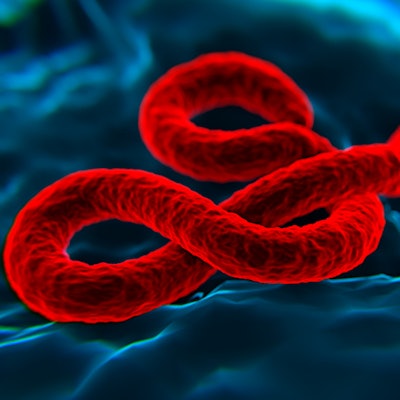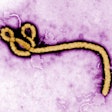
OraSure Technologies' OraQuick has become the first rapid diagnostic for detecting Ebola virus antigens to win marketing clearance from the U.S. Food and Drug Administration (FDA). The FDA's move should pave the way for similar diagnostic products to gain standard market entry.
The OraQuick Ebola rapid antigen test provides an initial diagnosis based on a test of proteins in blood from people living with the virus or from cadaveric oral fluid in those who have died from it. The FDA noted that any rapid and early diagnosis made with the OraQuick test "must be confirmed."
In a statement, the agency said it has been making the OraQuick test and others available to clinicians through its emergency use authorization (EUA) pathway for temporary unapproved products needed in health emergencies. But OraQuick is the first rapid test for Ebola virus disease (EVD) antigens to get marketing authorization.
"Today's marketing authorization of the first EVD presumptive rapid diagnostic test for Ebola virus antigens through the [de novo] review pathway reflects the ongoing collaboration between the U.S. government and test developers to gather additional data on EUA products," the agency said.
The FDA had given OraSure's test a breakthrough device designation, a status that allows for a highly collaborative approach with officials, with the goal of speeding time to market. The regulatory filing was supported by clinical studies from living and deceased individuals afflicted with Ebola during the 2014 outbreak of the disease in West Africa. Data supported the test's efficacy in detecting the virus in people with symptoms.
The test works best when an individual's virus level is high enough to be detected. It is not suitable for people with no symptoms or mild symptoms, according to the agency. It is not to be used, for example, to screen people at airports, the FDA explained.
More standard approvals on the way?
"The dangerous nature of the Ebola virus makes IVD testing a necessity, and for that testing to provide results as fast as possible," commented Bruce Carlson, publisher of market research firm Kalorama Information, a sister company of LabPulse.com. "The disease requires not only that patients must be cared for quickly but also that others and healthcare workers have adequate protection."
Although this is the first rapid test to get a standard approval, there are other rapid tests cleared through the FDA's emergency pathway, such as Chembio Diagnostic Systems' DPP Ebola assay. Chembio's test received its authorization from the FDA in 2018.
Carlson doesn't see a practical difference between having a marketing clearance and an emergency use authorization; as long as Ebola represents an emergency threat, the tests may be provided and there is no sign of the disease abating. There is an ongoing Ebola outbreak in the Democratic Republic of the Congo that first emerged in August 2018, according to the U.S. Centers for Disease Control and Prevention (CDC). It is the tenth and largest outbreak there and the largest since the virus was discovered in 1976, the CDC noted.
"Enough time has passed for the regulatory process to catch up with the disease threat, and we should see more approvals," Carlson said.







